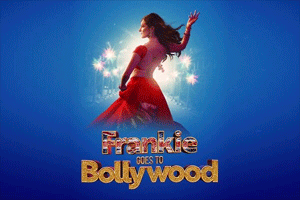Frankie Goes to Bollywood at Southbank Centre’s Queen Elizabeth Hall – review
The Rifco Theatre Company, Watford Palace Theatre and HOME Manchester co-production runs until 18 August

Frankie grew up on her Maa’s first love: Bollywood, and its heroes, strong, romantic, and brave. But as an adult, Frankie now just works in a cinema in Milton Keynes – until, as the title of this new musical suggests, a chance encounter with up-and-coming Bollywood director Prem pulls her into Mumbai and the elite world of Bollywood filmmakers, where, of course, nothing is as glitzy as it seemed on the screen. The wonderfully charming Laila Zaidi’s Frankie ends up a star of the silver screen, powerful in a way she’s never known before, but then has to figure out what exactly she can do as a cog in this machine.
Frankie Goes to Bollywood begins, then, as a meta-theatrical fairytale, telling the story of Frankie’s rise to fame as a Bollywood movie itself, while never afraid to play up and laugh (lovingly) at its own tropes. It’s joyous, bright and fun, and Andy Kumar’s impeccable work as movement director and costume designer is the pièce de résistance here, dizzying and perfectly building up Frankie’s world, poised between the real and the dreamlike. This absolute commitment to the genre and tone turns Frankie Goes to Bollywood – which can be a little hazy around the details in plot or message otherwise – into such a delightful one.
After the froth and wry humour of the first act, director and book writer Pravesh Kumar turns in the second to a critique of how Bollywood treats its women. Frankie is keen throughout the show to find her people, the family promised by Bollywood stories themselves – forgetting, strangely, for much of the show that her best friend and sister-cousin Goldie was already offering her this in Milton Keynes – and so enters a relationship with her older co-star and member of big Bollywood family Raju King, or RK. But when her partnership with RK only offers the chance to retire rapidly from making films and start to make babies instead, Frankie teams up with the other ladies (and less problematic men) in her new life to start making Bollywood films that offer better parts for women.
This anti-patriarchal line gets a bit lost, unfortunately, partially because the show takes its time to really get into it and has to wrap it up quickly. It’s also a shame that it doesn’t get more into how Bollywood’s version of masculinity is just as punishing for its leading men – there’s a song that starts to explore this for RK, but the show then instead leans into emasculation, laughing at him for losing his hair and his relationship with his mother. It’s a shame that there can’t be a version of Bollywood in which both Frankie and RK can thrive.
But the show does serve its female characters well. For me, one of the most moving and surprising notes was from Goldie early on, who dreams of being in Bollywood films but knows that as a “chubby” woman, this will be incredibly hard. It’s something rarely discussed on or off stage, and Katie Stasi’s performance as Goldie is lovely, with subtlety and depth. Similarly complex and a joy to watch is Helen K Wint as Malika, Bollywood’s former queen, shunned from favour once Frankie’s on the scene.
It’s a fun evening, and does particularly well at the hard balance of enough in-jokes for Bollywood lovers while also being accessible to an audience who doesn’t know the genre – and more than that, Frankie Goes to Bollywood is a great show to bring these groups together.

















